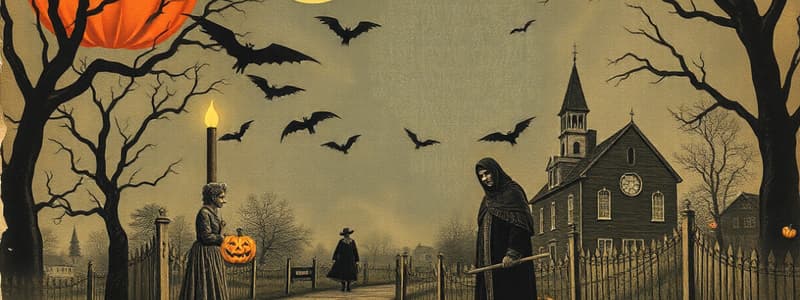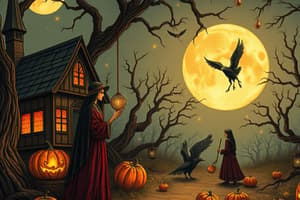Podcast
Questions and Answers
What ancient festival is considered the origin of Halloween?
What ancient festival is considered the origin of Halloween?
- All Hallows' Eve
- Pomona Day
- Samhain (correct)
- Feralia
Which Roman festival was integrated into Halloween traditions to honor the deceased?
Which Roman festival was integrated into Halloween traditions to honor the deceased?
- Celtica
- Feralia (correct)
- Pomona Day
- Lupercalia
What significant change did Pope Gregory III make in the 8th century related to Halloween?
What significant change did Pope Gregory III make in the 8th century related to Halloween?
- Popularized pumpkin carving
- Established early trick-or-treating
- Banned pagan celebrations
- Designated November 1st as All Saints' Day (correct)
What medieval practice involved the poor going door-to-door for food?
What medieval practice involved the poor going door-to-door for food?
Which activity became popular in America during the 19th century related to Halloween?
Which activity became popular in America during the 19th century related to Halloween?
Which cultural celebration is similar to Halloween and honors deceased loved ones?
Which cultural celebration is similar to Halloween and honors deceased loved ones?
By the late 20th century, what had Halloween become known for commercially?
By the late 20th century, what had Halloween become known for commercially?
Which contemporary theme dominates modern Halloween celebrations?
Which contemporary theme dominates modern Halloween celebrations?
What was the primary purpose of the bonfires during the Samhain festival?
What was the primary purpose of the bonfires during the Samhain festival?
Which festival did the Samhain tradition merge with during Roman influence?
Which festival did the Samhain tradition merge with during Roman influence?
What did children practice known as 'Souling' in relation to Halloween?
What did children practice known as 'Souling' in relation to Halloween?
How did the designation of November 1 as All Saints' Day influence Halloween?
How did the designation of November 1 as All Saints' Day influence Halloween?
What is a defining modern practice of Halloween in America?
What is a defining modern practice of Halloween in America?
Flashcards are hidden until you start studying
Study Notes
History Of Halloween
-
Origins:
- Halloween's origins date back to the ancient Celtic festival of Samhain, celebrated around November 1st.
- Celts believed that on the night before Samhain (October 31), the boundary between the living and the dead blurred, and spirits could return to Earth.
-
Roman Influences:
- After the Roman conquest of Celtic territories, two Roman festivals were integrated:
- Feralia: A day in late October to honor the deceased.
- Pomona Day: Celebrating the Roman goddess of fruit and trees, symbolizing the harvest.
- After the Roman conquest of Celtic territories, two Roman festivals were integrated:
-
Christian Adaptation:
- In the 8th century, Pope Gregory III designated November 1st as All Saints' Day, honoring saints and martyrs.
- The evening before became known as All Hallows' Eve, later shortened to Halloween.
-
Medieval Practices:
- During the Middle Ages, customs included "souling," where the poor would go door-to-door for food in exchange for prayers for the dead.
- The practice of lighting candles and carving turnips to ward off evil spirits began.
-
Modern Halloween:
- Halloween took on a more secular and community-focused approach by the 19th century in America.
- The celebration included activities such as costume parties and trick-or-treating, becoming widely popular in the mid-20th century.
-
Cultural Variances:
- Different cultures celebrate Halloween-like customs:
- Día de los Muertos in Mexico honors deceased loved ones with altars and celebrations.
- Other countries have unique traditions that may not include the spooky elements of Halloween.
- Different cultures celebrate Halloween-like customs:
-
Commercialization:
- By the late 20th century, Halloween became a major commercial holiday, with a focus on costumes, decorations, and candy sales.
- It is now one of the most celebrated holidays in the United States and various parts of the world.
-
Contemporary Themes:
- Themes of horror, fantasy, and folklore dominate modern Halloween celebrations.
- Popular activities include haunted houses, themed events, and pumpkin carving.
Origins of Halloween
- Halloween's roots lie in the ancient Celtic festival of Samhain, celebrated around November 1st.
- Celts believed that on the eve of Samhain, October 31st, the boundary between the living and the dead became blurred, allowing spirits to return to Earth.
Roman Influences
- The Roman conquest of Celtic territories led to the integration of two Roman festivals into the celebration:
- Feralia, a day in late October to honor the deceased.
- Pomona Day, celebrating the Roman goddess of fruit and trees, symbolizing the harvest.
Christian Adaptation
- In the 8th century, Pope Gregory III designated November 1st as All Saints' Day, a celebration honoring saints and martyrs.
- The night before All Saints' Day became known as All Hallows' Eve, later shortened to Halloween.
Medieval Practices
- During the Middle Ages, a practice known as "souling" emerged, where the poor traveled door-to-door requesting food in exchange for prayers for the dead.
- The tradition of lighting candles and carving turnips to ward off evil spirits originated during this time.
Modern Halloween
- By the 19th century in America, Halloween shifted towards a more secular and community-focused celebration.
- Activities like costume parties and trick-or-treating became popular, gaining widespread acceptance in the mid-20th century.
Cultural Variations
- Different cultures celebrate Halloween-like customs with unique regional traditions.
- Día de los Muertos, celebrated in Mexico, honors deceased loved ones with altars and festive celebrations.
- Some countries have unique traditions that don't necessarily involve the spooky elements of Halloween.
Commercialization
- Towards the end of the 20th century, Halloween became a major commercial holiday driven by sales of costumes, decorations, and candy.
- It is currently one of the most celebrated holidays in the United States and various parts of the world.
Contemporary Themes
- Modern Halloween celebrations are heavily influenced by themes of horror, fantasy, and folklore.
- Popular activities include haunted houses, themed events, and pumpkin carving.
Origins
- Halloween's roots trace back to Samhain, an ancient Celtic festival observed on October 31st.
- Samhain marked the transition from harvest to winter, when the boundary between the living and dead was believed to be porous.
Celtic Practices
- Samhain festivities included bonfires and costumes as a way to deter ghosts.
- Food and drink were offered to wandering spirits.
Roman Influence
- Roman festivals like Feralia, dedicated to the deceased, merged with Celtic Samhain.
- This convergence shaped rituals and practices that honored the dead.
Christianization
- By the 8th century, Pope Gregory III designated November 1 as All Saints' Day.
- October 31st then became known as All Hallows' Eve, eventually shortened to Halloween.
Evolution in America
- Irish immigrants brought Halloween to America during the 19th century.
- Souling, a custom of children asking for treats in exchange for prayers for the deceased, developed in America.
Modern Practices
- Today, Halloween is a secular festival characterized by costumes, trick-or-treating, and haunted houses.
- Emphasis has shifted towards fun, community events, and commercial aspects, especially in the United States.
Current Trends
- Halloween is celebrated globally on October 31st, with variations in traditions like Día de los Muertos in Mexico.
- It has become a significant retail event for costume, decoration, and candy sales.
Studying That Suits You
Use AI to generate personalized quizzes and flashcards to suit your learning preferences.




